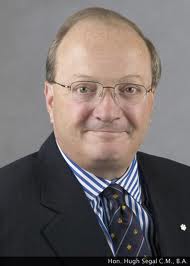The resignation of Conservative Senator Hugh Segal to become the new master of Massey College at the University of Toronto next June is great news for the college and gloomy news for the Senate. But it is probably welcome news, and a relief, for the Prime Minister’s Office, which could not figure out what to do with a senator – a Tory to boot – that it could not bend to its will.
Segal has many estimable qualities. He is firmly principled, as he demonstrated early on by his civil liberties opposition to the use of the War Measures Act by Pierre Trudeau’s government. He demonstrated his independence again recently when he stood against the power of the prime minister and the pressure of his Senate colleagues to oppose the suspensions of Pamela Wallin, Mike Duffy and Patrick Brazeau in the Senate expenses affair.
For Segal, it was partly a question of loyalty to his friend, Wallin, but more importantly it was a matter of principle. As he saw it, the three were being cast out of Parliament without due process:
“[This] trashes the presumption of innocence, and may, if passed, be interfering in what are supposed to be independent police investigations. I support my prime minister on economic, trade, defence and foreign policy — but cannot support the government leader in the Senate on this motion. I will vote against it.” And he did.
A disclaimer: I have known Hugh Segal off and on for four decades; I have always liked him and admired his Red Tory independence; his high intelligence (he has the academic honours to confirm it); his knowledge of the entrails of government (as chief of staff to Brian Mulroney, he ran the PMO in the early 1990s; earlier he was a deputy minister in Premier Bill Davis’s office at Queen’s Park); his happy-warrior demeanor; and his wit (alas, a sense of humour is not a prerequisite for government service in Ottawa; Massey College students will surely appreciate him).
I first came across him when I was covering the 1972 federal election and Segal, then a 21-year-old University of Ottawa student, was the Progressive Conservative candidate (or sacrificial lamb) in the Liberal fief of Ottawa Centre. He lost, but he made it close in a very tight national election. Twenty-six years later, he ran for the Tory leadership, losing to Joe Clark (on Clark’s second time around).
Over the years, the peripatetic Segal has held executive jobs in the advertising, brewing, and financial services industries, written books and columns, taught university and served as president of the Institute for Research on Public Policy.
In 2005, Prime Minister Paul Martin, a Liberal, reached across party lines to appoint the eminently qualified Segal to the Senate. He is leaving at age 63, nearly 12 years before he reaches mandatory retirement.
Segal is leaving without seeing through his campaign for Senate reform. Shortly after his appointment to the upper house, Segal introduced a motion calling for a Canada-wide referendum on abolition of the Senate – not because he wanted he wanted to shutter the place, but because he wanted to kick-start the process of reform by involving the public in a discussion of the role of the red chamber.
Although no one who mattered in Ottawa paid any attention at the time, Segal tried again in 2007 and 2008. In 2010, he supported a bill that would have allowed provinces to hold direct elections to fill Senate vacancies in their jurisdictions. Again nothing happened, although this year the Harper government referred a package of reform initiatives to the Supreme Court of Canada to test their constitutionality.
Meanwhile, Segal will enjoy the leisurely (even by Senate standards) pace of life at Massey College where (another disclaimer) my old friend, former Globe and Mail colleague and occasional tennis partner, John Fraser, is retiring after nearly 20 years as master. Fraser has done a fine job building a community of scholars as envisaged by Massey’s first master, the novelist Robertson Davies.
Cambridge resident Geoffrey Stevens, an author and former Ottawa columnist and managing editor of the Globe and Mail, teaches political science at Wilfrid Laurier University and the University of Guelph. His column appears every Monday in the Waterloo Record and Guelph Mercury. He welcomes comments at [email protected]



